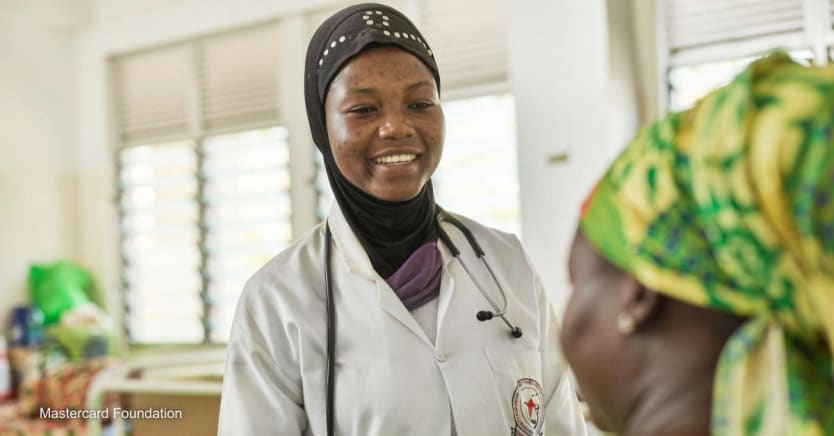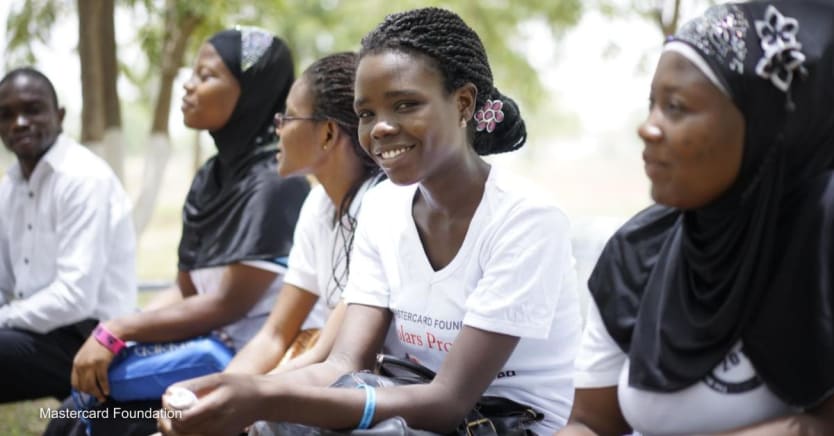
Africa's youthful energy is driving economic and social progress with its innovative ideas and entrepreneurial drive. With 40% of the population under the age of 15, and another 100 million children expected by 2050, Africa is projected to have the youngest and largest workforce globally by 2035. This presents the continent, and the world, with an unprecedented opportunity to increase food security, improve health, heal our planet, and create jobs. But it hinges on a critical factor: harnessing the full energy and talents of young women and girls across Africa.
The Mastercard Foundation’s new report, Young Women in Africa: Agents of Economic Growth and Transformation by 2030, forecasts that accelerating young women’s economic productivity can unlock an estimated $287 billion in economic value in Africa — equivalent to a 5% increase in gross domestic product — and create 23 million jobs on the continent by 2030. What would it take to achieve this? Several factors. First and foremost, we must ensure that girls and young women have access to education and stay in school.
Right now, 34 million adolescent girls of secondary school age are not in school. Only 26% of young women in sub-Saharan Africa complete secondary education. About 8% are enrolled in tertiary education. This translates into staggering losses in lifetime productivity and earnings equivalent to a $10 billion loss in GDP across the continent.
Join the Mastercard Foundation at the U.N. General Assembly!
On Sept. 22, 2024, the foundation will be livestreaming two events, which address girls' education and women's economic empowerment in Africa. Submit questions to the panel and sign up for the livestream here.
The Mastercard Foundation is guided by our vision of a world where everyone has the opportunity to learn and prosper. We have worked with extraordinary organizations over the past decade to support girls' education and increase women's participation in the workforce. Substantial progress has been made, thanks to the dedication and grassroots efforts of our partners.
To date, the Mastercard Foundation Scholars Program has enabled over 45,000 young women and men to access quality education and develop their leadership capabilities, working with more than 40 education partners. Additionally, we work with young ed-tech entrepreneurs to deliver education via digital platforms to 2 million young people. About 70% of them are young women.
Much more remains to be done.
The economic future of Africa depends on the empowerment of all young people, especially girls and young women playing a full and meaningful role.
—We are scaling successful programs to advance access to secondary education and improve post-secondary school pathways, including tertiary education, technical and vocational education and training, or TVET, and work opportunities. These will enable girls and young women to access and complete their education. Over the next seven years, the foundation will significantly expand our long-standing partnerships with CAMFED and the Forum for African Women Educationalists, or FAWE, with $360 million — to support over 70,400 young women and girls who live in economically disadvantaged communities to complete their education, start their own businesses or access employment.

Take the example of Juliana: Born into a family of seven in the northeast region of Ghana, Juliana’s journey to becoming a qualified nurse was fraught with challenges. Her parents, who are farmers, struggled to pay for her school fees and learning materials. Through our partnership with CAMFED, she completed her secondary education and went on to study nursing at Central University in Ghana. Today, she not only serves her community as a nursing officer, but also leads a social enterprise, the Sumwaana Shea Butter Processing and Marketing Co-operative, which is providing employment for over 100 women in her region. Juliana is a powerful illustration of how access to education and support transforms lives and communities.
Working with CAMFED and FAWE, we will deepen our collaboration with ministries of education across 10 African countries, over 500 universities and tertiary institutions, and more than 1,400 secondary schools, to ensure education systems are responsive to the needs of girls and young women. Through these partnerships, we will continue to foster collaboration with government entities, schools, and community stakeholders to integrate important program components such as implementing reentry policies for young mothers and promoting equitable allocation of education budgets. These programs will provide in-school mentorship to enable girls to access and complete secondary education. Additionally, they provide opportunities for those who left school to transition to tertiary education. These systems-level initiatives are expected to reach close to 3 million young people.
An SDG indicator on education is safe, but the fight isn’t over
A key measure of children’s reading and math levels won’t be dropped from a framework on the Sustainable Development Goals. But education experts aren’t happy with how the debate has been handled.
Education is the bedrock for realizing and sustaining Africa’s economic growth. As you’ll see in our report, integrating women into the workforce and enabling them to succeed as employees and entrepreneurs requires more than education. We also need policies that ensure young women have access to affordable capital, land, and equipment, as well as business networks and markets.
Importantly, we must understand and respect the unique roles many women play in their families and provide them with the right support. For example, many young mothers need affordable childcare options, transportation, and flexible work arrangements. This essential footing will enable them to pursue higher-paying jobs and entrepreneurial opportunities, driving both innovation and economic diversification.
At the upcoming United Nations General Assembly, we are convening leaders and practitioners who play an influential and impactful role in girls’ education and women’s economic empowerment in Africa. This exchange of ideas is focused on insights into successful programs and how they can be expanded.
The economic future of Africa depends on the empowerment of all young people, especially girls and young women playing a full and meaningful role. Through education, economic integration, and a shift in mindsets, we can build a future where every girl can learn and every woman can earn, lead, and thrive.
This is not just a vision; it is an imperative to create a prosperous and sustainable Africa.
For more information please visit https://mastercardfdn.org/






